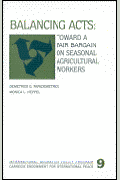A sharp downturn in the economy, like that experienced recently, has distorted government statistics. The problem is that the procedures used to correct raw data for seasonal fluctuations can too easily confuse the downturn with a change in seasonality. Indeed, this is a more general problem. Wright shows that the statistical authorities would produce more useful economic data if they adjusted their seasonal adjustment procedures to constrain seasonal factors to vary less over time than current practice. The paper has important implications for how to interpret month-to-month movements in all of our major economic time series.








